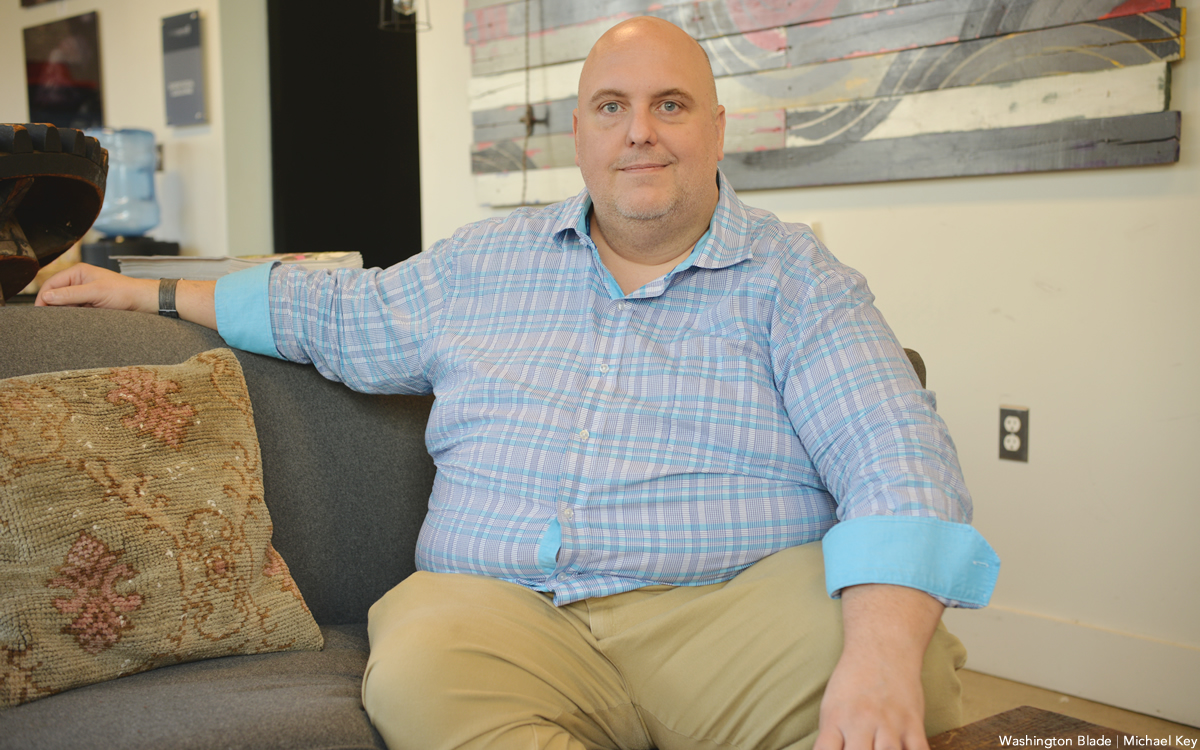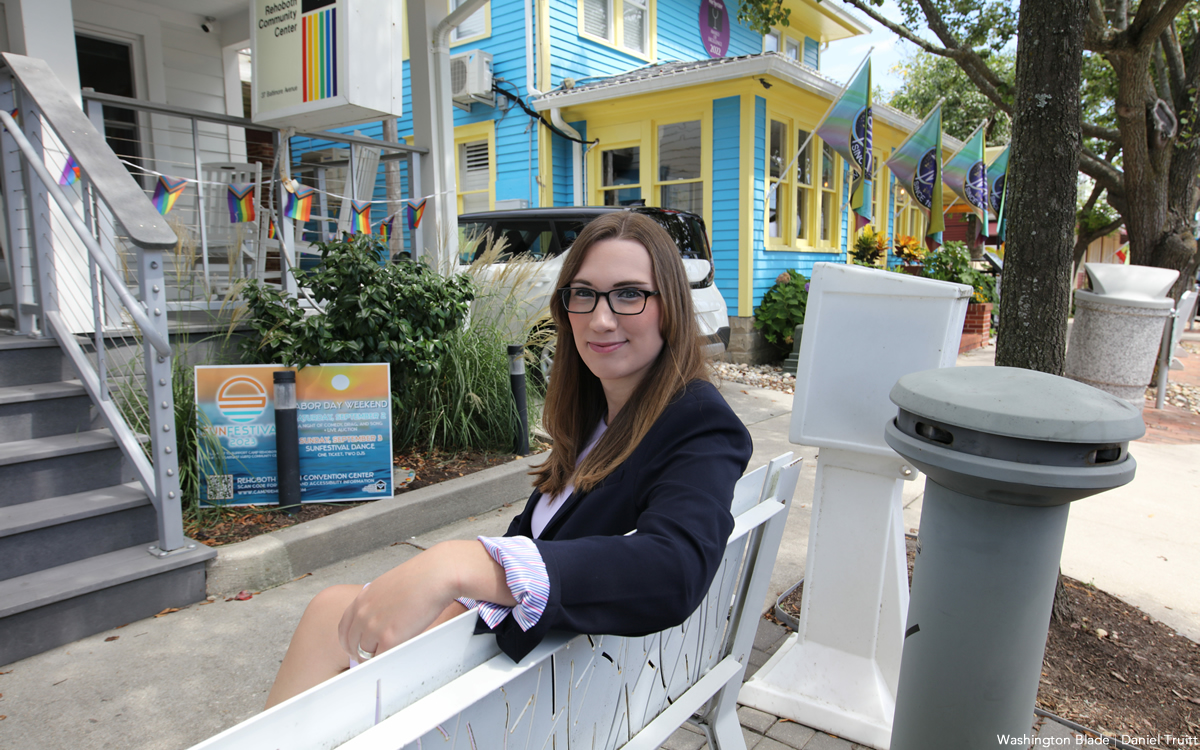Delaware
Former CAMP Rehoboth director launches Sussex Pride
Non-profit to focus on ‘the folks who really need help the most’

Sussex Pride, a new LGBTQ organization based in southern Delaware, announced its official launch last Friday in a press release from its founding board of directors. The nonprofit looks to serve Sussex County and the state as a whole through yearlong LGBTQ programming and advocacy.
David Mariner, Sussex Pride founder and director, began to conceptualize the organization after noticing disparities in access to LGBTQ resources among different communities in Sussex County.
While Rehoboth Beach already has resources for LGBTQ community members, that is not the case for the entire county, he said. Many areas surrounding the beachside hub experience the “greatest need” for advocacy and resources, yet face the largest accessibility barriers.
“What I wanted to do is connect with some amazing activists from across the county, and really see: Is there a way we could create a new organization that centers the needs of those folks,” he said.
The organization’s board of directors includes members from different backgrounds who can help contextualize the diverse experiences of LGBTQ community members across the county, he added.
For Sussex Pride, recognizing and addressing the needs of underrepresented communities also means speaking with individuals from those communities directly. The organization will conduct a county-wide assessment to determine areas of community need, paying particular focus to the needs of “LGBTQ youth, transgender and nonbinary individuals, LGBTQ People of Color, LGBTQ seniors, and those living in more rural areas of our state,” the press release read.
Mariner launched Sussex Pride shortly after stepping down from his role as executive director of nearby LGBTQ nonprofit CAMP Rehoboth on May 31 — a position he began in 2019. According to Mariner, Sussex Pride is interested in working with CAMP Rehoboth in the future.
“I enjoyed my time at CAMP Rehoboth,” he noted. “I certainly hope there’s opportunities for us to collaborate.”
Wesley Combs, president of CAMP Rehoboth, echoed Mariner’s sentiments, noting that he hopes the two organizations will have a collaborative relationship.
“We welcome more support for the LGBTQ community in Delaware and look forward to learning more about what Sussex Pride will be doing,” he said. “We are always interested in partnering with other organizations who share our values and are committed to creating a more positive Rehoboth as well as a more positive Sussex County and beyond.”
Jamie McKenna, a Sussex Pride board member, noted that bringing a new LGBTQ organization to Sussex County is not an indictment against those already in place, but instead a way to expand resources and make them more accessible. “I don’t think any one organization can adequately represent our entire community,” she said.
Kathy Carpenter Brown, another Sussex Pride board member, noted that there is currently a lack of trans-specific resources among local LGBTQ organizations, which the new nonprofit hopes to remedy.
In 2017, Carpenter Brown founded Rehoboth TransLiance, a social group for transgender and gender diverse individuals in the Rehoboth Beach area. Through social events and educational resources, the organization has worked to create space for gender diverse Delawareans in areas where, previously, it might not have existed.
Carpenter Brown noted that her involvement with the organization led Mariner to invite her to get involved with Sussex Pride. When asked to join the organization, “I brought a few friends along with me,” she added, referring to other trans women on the board of directors.
Rehoboth TransLiance will now find a home as a subgroup of Sussex Pride, working on the forefront of its trans-specific programming, Carpenter Brown said. The organization will continue to create events and resources for the Sussex County trans community, and has secured an office and meeting space in a local church, she added.
When it comes to Sussex Pride’s motivations for creating trans-specific resources, “I don’t think it’s useful to look at it as [doing] what CAMP Rehoboth doesn’t do,” McKenna added. “Almost nobody does it anywhere, and we’re trying to bring something new or, at least, something relatively rare.”
For Carpenter Brown, the top priority in supporting local trans community members is clear: creating a local trans-inclusive and gender-affirming healthcare facility. She pointed to the attention TransLiance’s table at Delaware Pride received as evidence of a deep community need for trans-specific education and healthcare resources.
“There are so many people out there with questions, so many people looking for support, and they just don’t know where to find it,” she explained. “I know this area is known as a liberal area … but we really have no resources.”
“We don’t have the healthcare that we need. We don’t have the education that we need,” she added. “We don’t have the doctors, therapists and psychologists and all the things that the state and federal government requires us to have in order to get the healthcare we need.”
McKenna echoed Carpenter Brown’s sentiments, noting that the barriers she experiences accessing healthcare might outright prevent other trans individuals from accessing important medical services.
“I go up to Philadelphia to get my hormones, my basic medical care. There’s really nowhere around here that people can go,” she explained. “I’m lucky enough to have the resources where I can get up there, but a lot of people around here don’t. If you’re some 19-year-old trans kid just coming out, you might as well be on the moon trying to get care out here.”
Nicholas Lee, another Sussex Pride board member, noted that living in Lewes, Del., has made accessing LGBTQ resources in Rehoboth Beach more challenging, even though the two towns are in the same county. “We don’t have the best transportation system,” and “we don’t have a particular central location,” he explained.
Carpenter Brown said that she would like to create the healthcare facility as well as a trans community center in Georgetown, Del. — a location central to the county and more accessible to those from rural areas than coastal towns.
“When the opportunity came to set up a nonprofit that can help all Sussex County, I got excited,” Lee said. He noted that the name ‘Sussex Pride’ demonstrates the organization’s underlying goal to help “the whole entire community,” which requires “broadening” current LGBTQ resources to more directly consider the needs of local rural communities.
“I think in the big picture, it’s important to have an organization that people feel welcome in, in terms of the whole community,” he added.
While the nonprofit is still in the early stages of development, it has a “wonderful group of people who are now donating monthly to sustain its work,” Mariner said. The organization will also be “looking at a wide variety of funding sources in the near future.”
Mariner pointed to the experiences of a young woman he met last year as further evidence of a deep need for LGBTQ resources in rural communities across Sussex County.
“Her family discovered that she was a lesbian and kicked her out of their home. For a couple months, they didn’t talk to her,” he explained. “I’m not familiar with that happening in Rehoboth Beach, but I know it happens in other parts of the county on a regular basis.”
For Mariner, it is stories like those that affirm the importance of Sussex Pride — an organization that will focus on “the folks who really need help the most.”
Sussex Pride will host its first in-person event, a bus trip to the New York City Pride Parade, on June 26. For more information, visit sussexpride.org.
Delaware
Delaware guv endorses opponent of trans U.S. House candidate
Supporters, polling say State Sen. McBride leads in race

Delaware’s Democratic governor, John Carney, this week announced he has endorsed his former State Housing Authority Director and cabinet member Eugene Young over Delaware State Sen. Sarah McBride, the nation’s first openly transgender state senator, for Delaware’s single seat in the U.S. House of Representatives in the state’s Sept. 10 Democratic primary.
Carney’s endorsement of Young came one day before the Delaware Building and Construction Trades Union announced it and 20 of its local unions from across the state have endorsed McBride for the congressional seat, calling her “a champion for working people.”
McBride’s campaign website shows that she has also received the endorsement of 21 of her fellow members of the Delaware Legislature, including 11 state senators and 10 members of the state House of Representatives. A third candidate in the race, former Delaware State Treasurer Colleen Davis, recently withdrew her candidacy citing health reasons and has endorsed McBride.
A public opinion poll of likely Democratic primary voters conducted in September showed that McBride was leading Young by a margin of 44 percent to 23 percent. The poll was commissioned by the Human Rights Campaign Equality Votes PAC, a national LGBTQ rights organization.
Campaign finance records filed with the Federal Election Commission show that McBride had a commanding lead over Young in money raised for her campaign as of Dec. 31, 2023, the most recent filings released by the FEC. At that time, McBride had raised a total of $1,236,066, with $850,179 in cash on hand. The FEC figures show Young had raised a total of $287,300 for his campaign, with $199,594 in cash on hand.
Supporters of both McBride and Young have said each of the two would make history If elected to the U.S. House. McBride would become the nation’s first transgender member of the U.S. Congress. Young’s supporters point out he would become Delaware’s first Black man elected to Congress.
The current Delaware U.S. House member, Lisa Blunt Rochester (D), became the state’s first Black woman to hold a congressional seat in Delaware when she was first elected in 2016. Rochester is giving up her House seat to run for the U.S. Senate seat being vacated by incumbent Sen. Thomas Carper (D) who is not running for re-election.
Sean Meloy, vice president for political programs for the LGBTQ Victory Fund, which raises money for LGBTQ candidates running for public office nationwide, said he did not think Carney’s endorsement of Young would have a significant impact on the election.
“The governor has been doing work with his former cabinet member on the campaign trail for the last few months,” Meloy told the Washington Blade. “So, I don’t think it’s that big of a surprise. I think it’s a formalization of what most people have expected was coming and what was already happening,” he said. “I don’t think it’s going to be that big of a change.”
Meloy added, “I think what would be of interest to voters is that Sarah got like 20 union endorsements today from all across the state and from different types of groups. So, I think that’s going to help Sarah continue to succeed more than the governor’s endorsement of his cabinet member.”
At the time it released its poll in September showing McBride ahead of Young, the Human Rights Campaign credited McBride with working “to pass vital policies for her constituents, like paid medical and family leave, as well as laws making Delawareans safer by restricting the availability of assault weapons and high capacity magazines.” It added, “Her depth of understanding on the issues that matter to most of the people of Delaware is built on a lifetime advocating for her neighbors and making real change.”
In announcing his endorsement of Young, Carney praised Young for his work to help Delaware residents access affordable housing and put in place programs that helped residents become homeowners.
“Having served as a member of Congress myself, I know Eugene is the type of leader we need – someone who will roll up his sleeves and work together to find real solutions for the people of Delaware,” Carney said in a statement.
Delaware
Flight attendants union endorses Sarah McBride
Del. lawmaker would be first transgender member of Congress

Delaware congressional candidate Sarah McBride has earned the support of the Association of Flight Attendants, the nation’s most prominent flight attendant union.
It’s the second big labor endorsement for McBride after the United Food and Commercial Workers Local 27’s endorsement. The Association of Flight Attendants praised her for spearheading efforts to bring paid family and medical leave to Delaware, which will take effect in 2026.
“Sarah’s record in the Delaware Senate shows that she understands how to work collaboratively, build power and make big things happen,” the union’s president, Sara Nelson, wrote in a press release shared exclusively with the Washington Blade. “That’s the kind of leader we need in Congress, and we’re proud to endorse her candidacy.”
McBride also announced her support for creating a list of abusive passengers and banning them from flying. Each airline has a list of passengers banned from flying, but airlines don’t share the lists with each other, though Delta Air Lines has asked them, because of “legal and operational challenges,” as a representative for the airline industry trade group Airlines of America told a House committee in September 2021.
“Right now, someone can be violent towards a flight attendant or another passenger and walk directly off of that flight and onto one with a different airline to endanger more people,” an Association of Flight Attendants spokesperson wrote in a statement.
The Protection from Abusive Passengers Act would put the Transportation Security Administration in charge of building the database of passengers fined or convicted of abuse and has bipartisan support but has sat idly in committee since March. It failed to pass last year, and civil rights groups including the American Civil Liberties Union have charged that the list would disproportionately target people of color and strip and a better step to reducing hostility would be making flights more comfortable. Reports of defiant and unruly passengers have more than doubled between 2019, before the COVID-19 pandemic, and 2022.
“I thank the Association of Flight Attendants for endorsing our campaign,” McBride wrote in the press release. “It’s important that we recognize and celebrate the symbiotic relationship between strong, unionized workforces and the continued growth of employers here in our state.”
The union representing 50,000 flight attendants across 19 airlines is putting pressure on airlines to grant union demands in contract negotiations. At American Airlines, unionized flight attendants voted to authorize a strike — putting pressure on the airline to accede to its demands. Flight attendants at Alaska Airlines say they are ready to strike but have not voted to authorize one yet. United Airlines flight attendants picketed at 19 airports around the country in August, ratcheting up the pressure.
The union’s endorsement adds to a growing list of McBride endorsements, including 21 Delaware legislators, the United Food and Commercial Workers, the Human Rights Campaign, EMILY’s List, and Delaware Stonewall PAC. McBride, who would be the first openly transgender politician in Congress, has powerful connections in Washington — including with the White House — and is favored to win Delaware’s lone House seat.
A poll commissioned by HRC shows her leading the pack of three candidates vying for the seat — 44 percent of “likely Democratic voters” told pollster company Change Research, which works with liberal organizations. The poll of 531 likely Delaware Democratic primary voters, though, was conducted only online — meaning those with less familiarity or access to the internet may not have been counted — and Change Research’s methodology for screening likely voters is unclear. The company also did not provide a breakdown of respondents by age, gender, and race, but says it uses an algorithm to make the results representative.
Nelson said McBride’s time in Delaware’s state Senate shows her prowess in building power and working collaboratively.
“That’s the kind of leader we need in Congress, and we’re proud to endorse her candidacy,” she wrote.
Delaware
Sarah McBride ‘not running to be the trans representative in Congress’
Delaware politico on agriculture, climate change, and making history

Sarah McBride is running for Delaware’s sole seat in the U.S. House of Representatives. If you ask her what the most important issues are for voters, she’ll tick off several things: The cost of education, prescription drugs, housing, fear of gun violence, fear of the Supreme Court, the wave of anti-LGBTQ legislation across the nation.
What’s not among them? Her gender identity – the fact that she’s transgender. But we journalists mention it at every turn – you’d be forgiven for wondering whether we know anything else about her. Even at MSNBC, the cozy cable home for liberals, her identity takes center stage.
“Sarah McBride campaigns to be first openly transgender member of Congress,” the lower third blares during McBride’s July 15 MSNBC interview.
“McBride on historic run for Congress,” another says.
“McBride would be the first transgender member of Congress if elected,” a third reads.
And every time her interviewer mentions it, she notes something along the lines of what she told MSNBC anchor Katie Phang: “I’m not running to be the transgender representative in Congress, I’m running to serve Delaware and to make progress on all the issues that matter.”
It begins to resemble a tango – only where the two dancers are dancing to two completely different songs. If it annoys her, she won’t say so publicly.
“Of course there’s going to be discussion about the potential of this campaign to break this barrier and to increase diversity in Congress and to ensure that a voice that has been totally absent from the halls of Congress is finally there in an elected capacity,” McBride says in a recent interview with the Blade. “While it’s not what this campaign is focused on, while it’s not what voters are focused on, it is certainly relevant to the young people who are feeling alone and scared right now.”
She’s running in a crowded primary against rising Delaware political star Eugene Young and former Delaware State Treasurer Colleen Davis. Curtis Morris Aiken and Alexander Nevin Geise, a Universal Life Church minister, have also filed to run, but neither has a campaign website. The primary is slated for April 2, 2024.
McBride, though, has a unique advantage – national name recognition and a close relationship with the Democratic Party’s elite, including President Joe Biden. She formed that relationship working to get Beau Biden, the president’s son, elected as Delaware’s attorney general in 2010 while studying at American University.
McBride continued to work in politics afterwards, later becoming the university’s student body president. In the last few days of her tenure in 2012, she announced something big: She is a woman, she is transgender. The announcement made waves in local and national media. Beau Biden called her to tell her he was proud of her. And then Joe Biden told her he was proud as well when she took a picture with him.
“Hey, kid, I just wanted to let you know I am so proud of you, and Beau is so proud of you, and Jill is so proud of you,” Biden, then the country’s vice president, told McBride. “And I’m so happy that you’re happy.”
Some years later, after pressing for legislation protecting trans Delawareans from discrimination, she got the chance to speak at the Democratic National Convention. Her 2016 speech paid tribute to her late husband, endorsed Democratic presidential candidate Hillary Clinton, and advocated for a better tomorrow. It moved some in the thousands-strong crowd to tears – and others to their feet.
“My name is Sarah McBride and I am a proud transgender American,” she told the crowd, beaming.

Four years later in 2020, she became the highest-ranking transgender person in the country in her role as a Delaware state Senator representing parts of Wilmington. A year later, President Biden appointed her to the Democratic National Committee’s Executive Committee. Her deep entrenchment in politics is reflected in her fundraising: As of the last filing period, July 15, she had already raised more than $400,000. Her opponents haven’t had to open their books yet, so we can’t compare fundraising.
But if you’re holding your breath, waiting for the president’s endorsement in the Delaware house race — don’t.
“The president is focused on his own race,” McBride says.
And McBride is focused on her race, hunting for votes wherever she can. She “fully” expects to go up and down the small state, she says, to every town, municipality, and everything in between to talk to voters. She’s not shying away from Delaware’s conservative-leaning, rural Sussex County either — despite roughly 60% of Sussex voters voting for former President Donald Trump in the 2020 presidential election.
“No voter is going to agree with me on every issue, and there will be some voters who will disagree with me on most issues, but that won’t stop me from fighting for them,” she emphasizes. “In the Delaware state Senate, almost every bill that I have passed has passed with bipartisan majorities.”
That’s Delaware though. National politics are a horse of a different color. Not that that worries McBride – she’s progressive and will push for progressive policies, she says, but will work with Republicans as much as she can. Sure, she says, there are major disagreements, but beyond the drama and the fever-pitched headlines, there’s actually a lot of agreement – though not enough for her to expect any endorsements from Republicans.
Meanwhile, the so-called culture wars dominate the national conversation. The Human Rights Campaign issued a state of emergency for LGBTQ+ people in the United States, counting a record 75 anti-LGBTQ+ bills signed into law just six months into 2023.
McBride has gotten her fair share of threats herself, to the point where she says she hasn’t had a job where she hasn’t received death threats and transphobic attacks.
“When I was making the decision whether to run, one of the things I had to grapple with was the risk that comes with it at a moment where politicians have so clearly tried to dehumanize the trans community,” she said. “I know that with dehumanizing rhetoric comes dehumanization. And with dehumanization, hate and violence become that much more possible.”
Still, she says, anti-trans politicians and activists shouldn’t be able to restrict trans people from participating in democracy, to scare trans people into silence. The LGBTQ community is more united than ever, she says.
It’s clear the attacks won’t silence her – she expects to be a force to be reckoned with if she is elected to Congress, even as a first-term legislator. She points out that she managed to pass a bill for paid family leave starting in 2026 – despite the political observers laughing in her face – through the Delaware Legislature in her first term.
On the issues, though, McBride is harder to pin down beyond the statements on her website. She’s running to represent a state whose fifth-largest industry is agriculture, for example, but her website doesn’t mention agriculture. McBride says it’s just a matter of time.
“We’re going to be further building out the policy agenda,” she says. “I don’t know that anyone has any specific details on foreign policy or agricultural policy on their websites yet.”
She then pivots to a familiar talking point – farmers and agriculture workers, just like her, know what it’s like to be underrepresented in government. She knows what it’s like to be “unseen and unheard” by the government. She knows what it’s like to be attacked by her own government. She’s secured the endorsement of Delaware’s United Food and Commercial Workers. She’s running to represent all Delawareans and she’s listening to all of them on her tour through the state.
“A campaign is a conversation,” she emphasizes.
The time for conversation is quickly running out, though, when it comes to mitigating the climate crisis. Delaware is the lowest-lying state in the country, making it even more vulnerable to rising seas and flooding. The Sierra Club’s Delaware chapter has endorsed her twice, but McBride’s climate policy proposals are so far murky. The U.S. must become carbon neutral by 2050, she says – something Delaware has already committed to.
We need “bold goals,” she says, to achieve carbon neutrality, to prevent the country from emitting more greenhouse gases than its forests, shrubs, grasslands, sea grasses, and more can remove.
So do we need a carbon tax, where emitters have to pay for every ton of greenhouse gases they emit? She didn’t directly answer. A ban on new fossil fuel projects? She didn’t directly answer. Don’t we need to move away from carbon credits, which in theory certify that one ton of carbon dioxide hasn’t been released into the atmosphere thanks to the purchase, given how hard it is to prove that toxic gasses weren’t released because of the purchase and the questionable investments that are made? It’s not an issue that has come up yet, she says. In general, we need to invest in new technologies, figure out ways to reduce the climate crisis impact, find ways to emit less, she emphasizes.
An important step forward, McBride said, is the Inflation Reduction Act. It invested billions into clean energy and tax breaks for electric cars and energy efficient home upgrades and could save roughly 3 billion metric tons of greenhouse gases according to the U.S. Department of Energy. She supports the law despite its greenlighting of the Mountain Valley Pipeline across West Virginia thanks to a deal struck with West Virginia Sen. Joe Manchin.
“Look, I think that most bills that have passed have components that many of us would not like,” she says. “And oftentimes those components are necessary to pass the bill.”
And she’s itching to pass bills and bring a fresh perspective to Congress. It seems few things will stop her — she’s determined to put in the work to win.
“This is a real race,” she says. “We’re leaving no stone unturned.”

-

 Africa4 days ago
Africa4 days agoCongolese lawmaker introduces anti-homosexuality bill
-

 World4 days ago
World4 days agoOut in the World: LGBTQ news from Europe and Asia
-

 District of Columbia3 days ago
District of Columbia3 days agoReenactment of first gay rights picket at White House set for April 17
-

 Africa3 days ago
Africa3 days agoUgandan activists appeal ruling that upheld Anti-Homosexuality Act












